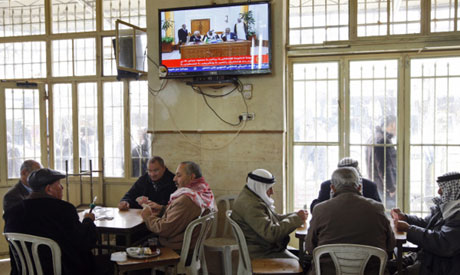
Palestinians play cards at a coffee shop as a television broadcasts the signing of a reconciliation agreement in Qatar between Hamas and Fattah, in the West Bank city of Ramallah, Monday, (Photo: AP).
Rallies, fireworks and traffic jams in support of the Doha Declaration, an agreement signed on Monday between Palestinian factions ruling the West Bank and Gaza, Fatah and Hamas, were unusually absent from Gaza city's streets.
Following previous announcements of unity between the two factions, Gaza city was witness to large-scale rallies. Monday's meeting in Doha, which resulted in an agreement to form a national government comprised of technocrats led by Mahmoud Abbas, did not generate the usual enthusiasm in Gaza.
Palestinians in Gaza told MENA that "past experiences with such agreements have frustrated us since they didn't achieve anything on the ground, they shook hands but didn't reconcile."
Palestinian Abdel Al-Hadi Aukal said that "the Gaza strip saw mass rallies never before witnessed in 2007 after a unity deal in Mecca. Fireworks were launched and we stayed up until dawn in the Gundi area in downtown Gaza but nothing happened afterwards, and then came the Cairo agreement, and similar rallies took place but it didn't lead to anything. This points to a lack of seriousness in the implementation of the agreements and so the issue of conciliation between Fatah and Hamas has become boring to the Palestinian street, as well as creating an air of distrust."
Aukal nevertheless expressed hope that the Doha agreement will realise different and positive results, that would satisfy the Palestinian street and end the bitter division between Fatah and Hamas.
Pharmacist Talal Abu Rahma said that reconciliation is not trusted by the street. "There have been many reconciliation meetings between Fatah and Hamas in Cairo, Mecca and Qatar that have not yielded anything, he said. Abu Rahma does not expect any tangible progress in terms of reconciliation.
Commenting on Abbas' premiership of the prospective government, Abu Rahma asked rhetorically, "isn't there a single Palestinian in the West Bank and Gaza who qualifies to head the government?" He said that the choice of Abbas would not bring the sides any closer.
Naji Shurrab, a Gaza-based political analyst, disagreed with this view, predicting that the Doha agreement would be followed by others, saying that the current political environment, both in Palestine and across the regime, is different from previously. He described the current environment as "favourable to reconciliation" arguing that "Palestinian efforts will be crowned with reconciliation as long as there's a common vision."
Shurrab insisted that the moment is one of reconciliation aiming for the political construction of Palestine, so that Palestinians may adapt to the new regional reality, stressing that Palestinians cannot face the emerging challenges in a state of disunity. He added that choosing Mahmoud Abbas is a moderate solution to many problems and a manifestation of a common political vision, reflecting a high level of flexibility on the part of Hamas.
Short link: